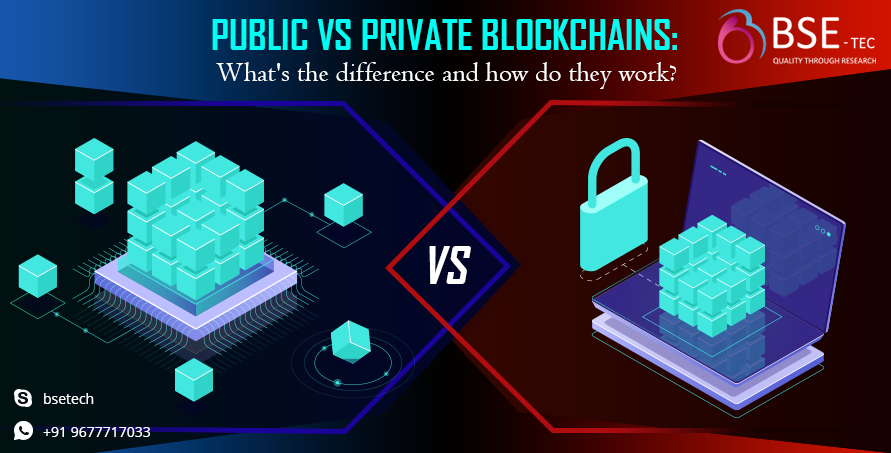Public vs. private blockchains: What’s the difference and how do they work?

The word blockchain is Mystical, as blockchain owes its name to the way it stores transaction data—in blocks linked together to form a chain.
Aware that blockchain can be used in healthcare, logistics, education, supply chain, government and other industries.
But need more information about its types and other features? Well, you are at the right place. Here is a brief blog post on blockchain networks, their differences and how they work.
Important components of a blockchain
A blockchain network consists of nodes, a distributed ledger, an asset, and a consensus algorithm. As of 2024, there are over 1,000 blockchains in today’s landscape, catering to a wide range of industries and applications.
These blockchains can be categorized into four major types: public, private, consortium, and permission. But what are the main figures of Public and private blockchains? Each different type of blockchain network has distinct characteristics and functionalities.
Public Blockchains vs Private Blockchains
| Public Blockchains | Private Blockchains |
| Public blockchains are open and permissionless networks where anyone can participate and validate transactions. Simpler: sharing of Google sheet link as anyone with the link can access | Private blockchains, also known as permissioned blockchains, are restricted networks where only selected participants are allowed to join and validate transactions. Simpler: Google sheet access is mentioned to specific email IDs. |
| Decentralized, meaning no single entity has control over the network | Networks are often operated by a single organization or consortium, providing more control and privacy. |
| Secured through mechanisms like Proof of Work (PoW) or Proof of Stake (PoS), where participants compete to validate transactions and create new blocks. | It makes use of consensus mechanisms like Practical Byzantine Fault Tolerance (PBFT) or Proof of Authority (PoA) to validate transactions. |
| Examples of public blockchains include Bitcoin and Ethereum. | Examples of private blockchains include Hyperledger Fabric, Ripple, Stellar R3 Corda and so on. |
Examples of public blockchain
Bitcoin is a public blockchain that allows anyone to participate in the network, verify transactions, and mine new blocks. Anyone can create a Bitcoin wallet or in any wallet link you prefer,
- Choose the type of wallet that works best for you.
- Sign up for an account, buy the device or download the software needed.
- Set up your security features, including a recovery phrase.
- Purchase cryptocurrency or transfer coins from another wallet or exchange.
and participate in the network without any central authority controlling the transactions as it is decentralized and operates on a proof-of-work consensus mechanism.
Examples of Private Blockchain
Hyperledger is a private blockchain framework developed by the Linux Foundation. It is designed for enterprise use cases and allows organizations to create their own blockchain networks with controlled access and permissions.
To know more about Hyperledger do visit unlike Bitcoin, Hyperledger is permissioned, meaning that participants in the network are known and trusted entities Implementation of private blockchain allows the organizations to maintain privacy, restrict access, and control the consensus mechanism.
Hyperledger offers various tools and modules that enable enterprises to build and deploy their blockchain applications.
Few applications that inherit hybrid approaches like NFT (Non-Fungible Tokens) can exist on both public and private blockchains. Ethereum. The most widely used blockchain for NFTs is Ethereum, Solana, Cardano, BNB Smart Chain (BSC)Polygon, AVAX and so on.
Few glimpses of public and private blockchains
Public Blockchain:
- Public blockchains involving Cryptocurrencies like Bitcoin and Ethereum are used for decentralized digital currencies.
- Public blockchains can provide transparency and traceability in supply chain processes, ensuring authenticity and reducing fraud.
- Public blockchains can be used for secure and transparent voting systems, ensuring trust and eliminating manipulation.
- Public blockchains can be utilized to prove ownership and protect intellectual property rights.
- Public blockchains provide a platform for the development and deployment of decentralized applications (DApps) across various industries.
Private Blockchain:
- Private blockchains are used by banks and financial institutions to streamline processes, facilitate secure transactions, and reduce cost.
- Private blockchains can be used to securely store and share patient data, ensuring privacy and interoperability among healthcare providers.
- Private blockchains can be employed by companies to enhance supply chain efficiency, track inventory, and improve logistics.
- Private blockchains can be used by governments for identity management, land registry, and secure document storage.
- Private blockchains can facilitate peer-to-peer energy trading, grid management, and tracking renewable energy certificates.
Conclusion
It’s important to note that blockchains are safe and illustrate the distinction between public and private blockchains may give you an outline but some industries benefit from a hybrid approach that combines elements of both Unclear? Don’t get confused in choosing the right blockchain, public or private. Consult BSEtec, a leading blockchain development company, guides you in blockchain networks depending on the specific use case, requirements, and desired level of business.
Did you find this article useful? Let us know by leaving a comment below, or join us on Twitter and Facebook.




